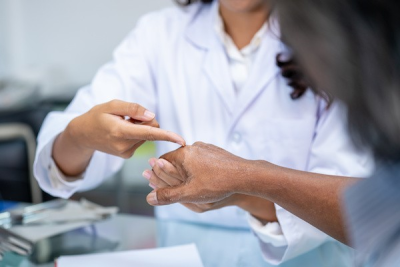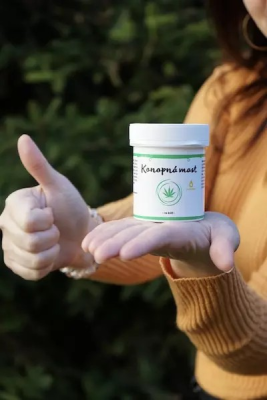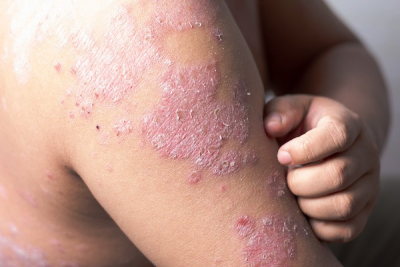How to get rid of psoriasis and what helps?
Author: Lucie Garabasova
Psoriasis is a skin condition that causes uncomfortable itching. We're here to provide you with all the information you need about what psoriasis is, how to get rid of it, and what treatments can help. We'll also dive into the effects of CBD and how hemp ointment can assist with psoriasis.
What is Psoriasis?
Psoriasis (psoriatic disease) is a non-contagious inflammatory skin disorder that causes a rash with itchy, scaly patches, most often found on the knees, elbows, torso, and scalp.
Psoriasis cannot be completely cured, but its symptoms can be managed to improve the quality of life.
The condition can be painful, disrupt sleep, and make it difficult to focus. Psoriasis tends to go through cycles, flaring up for a few weeks or months and then subsiding for a while. Common triggers for those with a genetic predisposition to psoriasis include infections, cuts or burns, and certain medications.
What are the symptoms of Psoriasis?
The appearance of the rash varies significantly from person to person, ranging from dandruff-like spots to extensive eruptions that cover most of the body:
- Scaly rashes that differ in color depending on skin type (usually purple shades with gray scales on brown skin, and red or pink with silver scales on white skin)
- Small scaly patches (commonly seen in children)
- Dry, cracked skin that may bleed
- Itching, burning, or soreness
There are several types of psoriasis, each with its unique symptoms:
- Plaque Psoriasis: The most common type of psoriasis, plaque psoriasis causes dry, itchy, raised patches of skin (plaques) covered in scales. These can appear on the elbows, knees, lower back, and scalp. The color of these patches varies with skin tone.
- Nail Psoriasis: This can affect fingernails and toenails, leading to pitting, abnormal nail growth, and color changes. Severe cases can cause nails to crumble or separate from the nail bed (onycholysis).
- Guttate Psoriasis: Primarily affecting children and young adults, guttate psoriasis is often triggered by bacterial infections like strep throat. It is marked by small, drop-shaped, scaly spots on the torso, arms, or legs.
- Inverse Psoriasis: This type affects the folds of the skin, such as the groin, buttocks, and breasts, causing smooth patches of inflamed skin worsened by friction and sweating. Fungal infections can trigger this type of psoriasis.
- Pustular Psoriasis: A rare form, pustular psoriasis causes clearly defined blisters filled with pus. It can occur in large patches or small areas, like the palms or soles.
- Erythrodermic Psoriasis: The least common type, erythrodermic psoriasis, can cover the entire body with a peeling rash that can itch or burn intensely. It can be short-term (acute) or long-term (chronic).
Psoriasis on the hands
Psoriasis on the hands typically appears in high-use areas like the elbows, wrists, fingers, or palms. Severe cases can make everyday activities like cooking or writing difficult. In addition to the classic raised, scaly plaques that flake off, painful pustules can form and crack open, leading to bleeding.
What causes Psoriasis?
The exact cause of psoriasis is unknown, but common triggers include certain medications, inappropriate skincare products, infections, unhealthy lifestyles, and hormonal changes. Try to identify the factors that may affect your psoriasis and avoid them when possible.
Psoriasis on the face
Facial psoriasis can be particularly challenging since the affected area is often highly visible and sensitive. When choosing creams and ointments for facial psoriasis, look for products specifically formulated for this delicate area and suited for facial skin.
CBD regenerative serums, with their anti-inflammatory properties, can also be helpful.
Additionally, minimizing the use of makeup and irritant-prone cosmetic products can improve psoriasis control on the face.
How does Psoriasis look on the scalp?
Psoriasis affects at least half of those who have the condition. It usually presents as scaly patches on the scalp, along with symptoms such as redness and itching. For scalp psoriasis, it's best to use shampoos designed for people with psoriasis, which soothe rather than irritate the skin.
What causes Psoriasis?
Psoriasis is generally considered an autoimmune disease with an unknown cause, although genetics play a significant role. Other factors may include:
- Recovery from an infection
- Certain medications
- Poor lifestyle habits (particularly smoking and alcohol consumption)
- Metabolic disorders
- Stress and anxiety
- Hormonal influences (such as puberty or menopause)
- Skin injuries or prolonged mechanical irritation
- Climate and weather
What helps with Psoriasis?
Although psoriasis cannot be completely cured, proper treatment can effectively relieve symptoms and prevent the progression of the disease.
Using the right skincare products is essential. While skincare alone won't cure psoriasis, it can soothe and moisturize the skin. Hemp ointments or CBD-infused creams, along with Vitamin C supplements, are also helpful.
How to treat Psoriasis?
For mild psoriasis, topical treatments such as creams, ointments, and lotions containing non-irritating ingredients are commonly used. More severe forms may require systemic treatments, including oral or injectable medications. Phototherapy, using UVB or PUVA, is a common method that combines light therapy with certain drugs. For mild cases, lifestyle changes, psychotherapy, or climatotherapy (exposure to saltwater and sunlight) may also have a beneficial effect.
In addition, some people benefit from biological treatments or cleansing and detoxifying regimens, particularly those involving hemp.
The best psoriasis creams and ointments
Top products contain ingredients like salicylic acid, urea, or glucocorticoids, which help to soften the skin and reduce scaling. Natural ingredients like aloe vera, hemp, coconut oil, and oats are also popular for providing relief without side effects.
CBD ointments are highly recommended for psoriasis due to their natural composition and high CBD content.
Consultation with a dermatologist is also crucial for individualized care recommendations.
How does CBD help for Psoriasis?
CBD's anti-inflammatory and antioxidant properties are particularly beneficial for people with psoriasis.
- According to a 2020 study, CBD's anti-inflammatory effects can help manage skin conditions like psoriasis.
- Another 2019 study confirmed the benefits of CBD ointments in improving psoriasis symptoms.
CBD also reduces anxiety, which is a known trigger for psoriasis.
We've found that combining CBD with CBG enhances the overall effect, available in CBD+CBG oil or hemp capsules, depending on personal preference.
"We know that some cannabinoids (CBD) bind to receptors in the human endocannabinoid system, which are responsible for inflammation, and can reduce the inflammatory response," says Dr. Yadav. He adds that one specific endocannabinoid, anandamide, may help suppress the rapid growth of skin cells in the epidermis called keratinocytes (the main skin cell, whose primary role is to create a protective barrier between the body and the external environment), which is a key aspect of psoriasis."
CBD (what is CBD?) also reduces anxiety, which can be a factor in the development of psoriasis.
From our own experience, we have found the greatest success with a combination of CBD + CBG. This combination enhances the overall effect. You can find this combination in CBD + CBG oil, or alternatively in hemp capsules (depending on your personal preference).
How to dose CBD + CBG oil for Psoriasis?
If you choose CBD + CBG oil, we recommend taking 1 drop three times a day, and after 5 days, increase the dose by another drop until you reach 3 drops three times a day. This should be a sufficient dose for the desired effect.
How to dose hemp capsules for psoriasis?
For CBD and CBG capsules, we recommend taking 1 capsule three times a day, and after a week, increase to 2 capsules three times a day. This dosage should provide the desired effect.
What worsens psoriasis?
We’ve discussed what helps psoriasis, but what makes it worse? In terms of diet, fatty foods, processed meats, sweets, and sugary foods are not recommended. Psoriasis also worsens during spring and autumn, so it's important to take extra care of your skin during these periods to minimize symptoms.
Additionally, psoriasis is aggravated by sunburn, cold temperatures, injuries, or dry air



